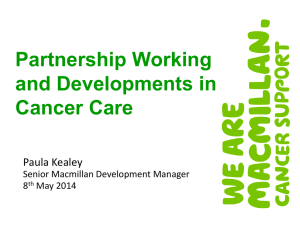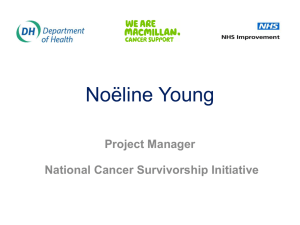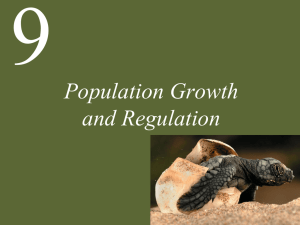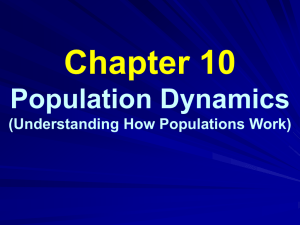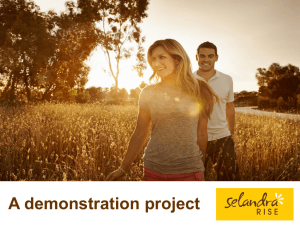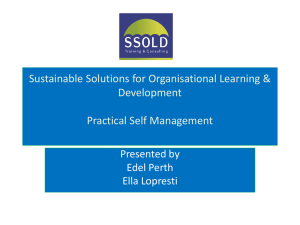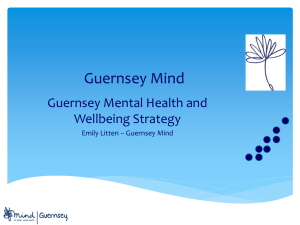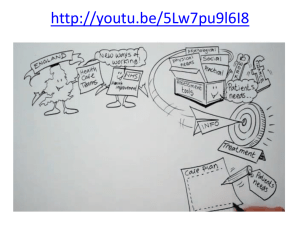Health and wellbeing - National Cancer Survivorship Initiative
advertisement
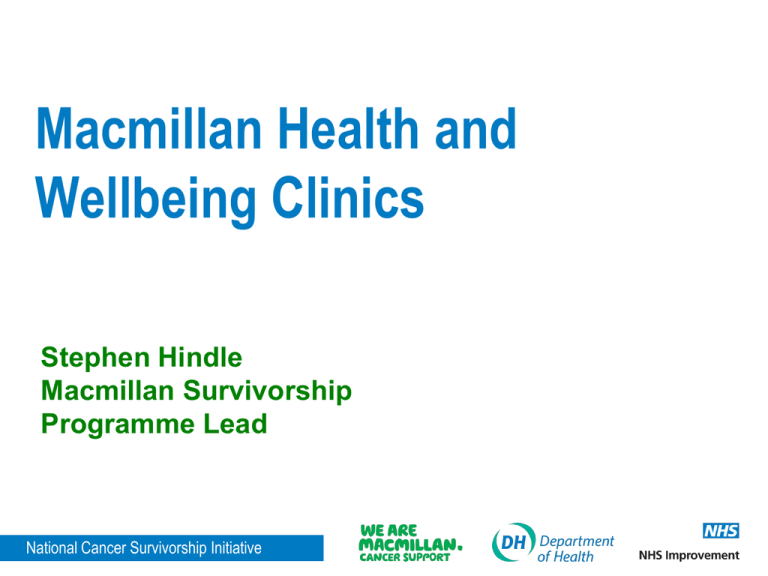
Macmillan Health and Wellbeing Clinics Stephen Hindle Macmillan Survivorship Programme Lead National Cancer Survivorship Initiative What are Macmillan H&WB Clinics? • ‘One-stop-shops’ providing information and support to help patients and carers to prepare for the transition after treatment • Aims to increase health and well being through support with: lifestyle management, managing your cancer, potential signs and symptoms, and how to get help • Volunteers play key roles in supporting clinics National Cancer Survivorship Initiative Key findings of 15 pilots 2010/11 • Increased patient knowledge and confidence • reported reduced anxiety and greater empowerment • more appropriate use of services • earlier intervention – may link to improved outcomes • ‘One-stop shop’ enabled access to services • reassurance of knowing support there in case of future need • Patients valued volunteers • Created relaxed atmosphere - put patients at ease • Providing information and signposting, explaining in simple terms, offering empathy & understanding • Volunteers’ personal experience of cancer gave encouragement to patients about their future National Cancer Survivorship Initiative Success Factors • Tailored approach to target audience for recruitment, delivery and environment • Information about HWB and what services patients can access • Successful processes for recruitment / attendance inc. • Event integrated in pathway (93% invited to Barts clinic attended ) • Booking systems which require patients to book appointment • Consultant referral; • Confirmation letters/phone calls • Volunteer Support & Role • Targeting BME groups in partnership with community organisations National Cancer Survivorship Initiative How to set up a Macmillan Health and Well Being Clinic • • • • • Review evaluation material Engage MDT and Medical lead Agree survivorship pathway Agree case of need Agree operational policy (include awareness raising/marketing) • Decide content • Set up steering group to monitor project • Lots of help on LearnZone! National Cancer Survivorship Initiative Health and wellbeing clinic component options Awareness & Engagement Community & patient / Third sector MDT via attendance at NSSGs / Primary care / HWB Integrated in cancer care pathways Training packages for Staff /Volunteers Pre HWB Inputs Pre HWB Assessment HNA undertaken Pre HWB questionnaire from patients/carers to shape event Referral Mechanisms, inc. self referral, booking, confirmation Administrative Support (paid/voluntary) National Cancer Survivorship Initiative Health and wellbeing clinic component options Processes – Tracker system HWB Clinic Event Intervention – HNA and care plan (supported by volunteer) –Self management tool and techniques, folder & action plan – Exercises eg Relaxation techniques Communication Models – Presentations / CDs/ video/ photo loops – Market stalls – One to one support / Group work/open discussions – Music/song/dance/drama Information Giving – Health and wellbeing messages and services to access – Information leaflets – Volunteer navigated support and signposting National Cancer Survivorship Initiative Health and wellbeing clinic component options Documentation Letter to GP, copy to patient and action in notes Follow up card with contacts, signs/symptoms of recurrence Action plan revisited at agreed time Post clinic evaluation and targeted support eg Belfast/Leeds model HWB Outputs Buddy Support Programme Patient referred to peer support programme where exist Timely Referral & Access to Other Services Third sector eg Sister to Sister group Leeds Dedicated programmes eg fatigue management Information Information pack/health and wellbeing booklets/rehab folder National Cancer Survivorship Initiative Why do Health and Wellbeing Clinics work? Health and Wellbeing Clinics help people to take control by: • Focusing on an individual’s role in maximising their own quality of life • Enabling attendees to find out more about what matters to them • Supporting an holistic approach by involving a wide range of support services • Acting as a springboard for continuing activity Aiming to increase self-efficacy National Cancer Survivorship Initiative What is self-efficacy? • ‘Confidence in the power to ‘master’ the environment influences active participation in health enhancing behaviours’ (Lev, 1992) • Your belief in your ability to make a difference to your life Four methods used for enhancing self efficacy: • ‘Mastery’ experiences – actual skills performance • ‘Vicarious’ experience – seeing others succeed • Verbal /social persuasion – positive feedback; suggestion; self instructed performance • Physiological feedback – emotional arousal National Cancer Survivorship Initiative How can Macmillan help you? – Getting Back in the Driving Seat/Taking Charge resource • Providing focus for person to think about what matters to them • Gives physical space where important issues can be recorded & reflected upon National Cancer Survivorship Initiative Contents of Taking Charge • • • • • Introduction about self management Tips to support self management Useful information Prompts for consideration of issues affecting health & wellbeing Plan for action to help move forward - focus on: • motivation for change • action to be taken • desired result • plan for setbacks • reward for achievement • utilising available support National Cancer Survivorship Initiative Taking Charge – supporting people to self manage National Cancer Survivorship Initiative How can Macmillan help you? – Getting the Right Messages Across presentation • Underpins aim of Health and Wellbeing Clinics to enable attendees to manage dayto-day issues as independently as possible. • Customise with local information and images & order different silhouettes at be.macmillan.org.uk • Additional information for presenters in notes • Can be used as training resource as well as in clinics Addresses issues of: Vocational Rehabilitation/ Cancer-Related Fatigue Work support Diet Emotional Issues Financial Issues Sexual Issues Physical ability Practical support National Cancer Survivorship Initiative How can Macmillan help you? – Learn Zone • learnzone.macmillan.org.uk Contains all information about Macmillan’s face-to-face L&D and elearning offer for PABC, volunteers, health and social care professionals and Macmillan staff (need to register) • Health and Wellbeing Clinics section: – Click on ‘Special Interest Groups’ on top left side of home page – Select ‘Health and Wellbeing Clinic’ from list of groups • Presentations and Resources section – Setting Up A Clinic National Cancer Survivorship Initiative Contact us at Macmillan • setting up a Health and Wellbeing Clinic: – Fay Scullion 07834 192222 fscullion@macmillan.org.uk – Jane Rudge 07834 191245 jrudge@macmillan.org.uk • self management support training for volunteers and resources – Suma Surendranath 020 7840 4982 ssurendranath@macmillan.org.uk • Stephen Hindle 020 7091 2045 shindle@macmillan.org.uk National Cancer Survivorship Initiative
